Slang words of any region add character, spice up conversations, and often make for a good laugh. Alaska is no different. Alaska slang words and phrases have been around since Alaska was first settled in 1741 by the Russians.
These slang words are still an integral part of Alaska’s culture today. From describing the weather to showing affection, here are some of Alaska’s most popular Alaska slang words and phrases.
Alaska Slang Words And Phrases
Alaska natives and other Alaska residents began using slang as a way to communicate with each other without worrying about outsiders understanding what they were saying.
These words and phrases are still used today, often by Alaska natives or those who live in Alaska.
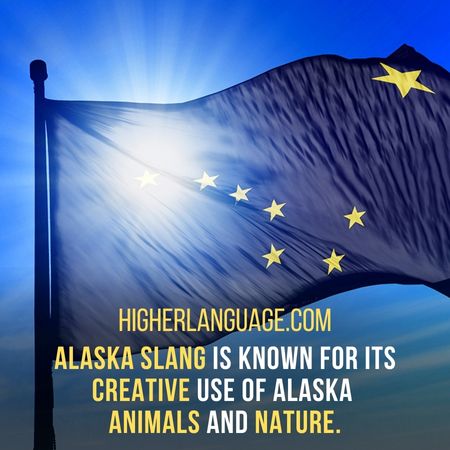
Alaska slang is known for its creative use of Alaska animals and nature and its humorous and sometimes crude phrases.
Some Alaska natives have even created words to add to the Alaska slang lexicon.
From berry picking to fishing, Alaska slang encompasses a wide variety of topics that reflect the culture and lifestyle of Alaska.
Whether you are visiting Alaska or want to learn more about Alaska slang, here are some of the most common Alaska slang words and phrases you should know.
45 Famous Alaska Slang Words And Phrases
Alaska’s unique culture and language set it apart from the rest. As a result, Alaska is home to many incredible Alaska-specific slang words and phrases.
Here are some of Alaska’s most famous Alaska Slang Words And Phrases:
1. Mosquito Wagon:
This phrase refers to Alaska’s small airplanes, which are necessary for travel in Alaska’s vast wilderness.
So, for example, if you hear someone say they are “heading out in the mosquito wagon,” they mean they are flying in an Alaska-owned small airplane.
This term originated from Alaska’s long mosquito season, which is necessary for Alaska’s biodiversity.
2. Bush Plane:
This phrase refers to Alaska’s larger airplanes, typically used for cargo transportation and travel in Alaska’s remote places.
This term originates from the areas of Alaska where these planes are commonly seen, known as “the bush“.
Alaska is known for its vast wilderness; bush planes are the only practical way to get around some parts of Alaska.
3. U-Park:
This Alaska slang word is a contraction of “University Park“, which describes the areas surrounding Alaska’s college campuses.

U-park can refer to both student parking lots, as well as open public lots.
This Alaska slang term is often used to refer to a parking spot that is highly coveted because of its convenience and location.
4. Cheechako:
This Alaska slang word describes newcomers, or “greenhorns“.
The word comes from the Chinook Jargon, which means “little one” or “newcomer”.
This Alaska slang term has a slightly negative connotation, describing people unfamiliar with Alaska and its customs.
5. Dutch Oven:
This Alaska slang word refers to an oven-safe pot typically made of cast iron.
It’s used for many cooking tasks, from baking bread to braising meat.
In Alaska, it is commonly used for outdoor cooking, particularly when camping or during winter months.
6. Nanasim:
This Alaska slang word describes an elder or respected person within a community, such as a clan leader or spiritual advisor.
It’s derived from the Alaska Native term for grandmother and can be used as a term of respect and endearment.
For example, someone might say, “We asked Nanasim for guidance on the best way to proceed.”
7. Polar Bear Plunge:
This Alaska slang phrase describes an activity in which people bravely jump into cold bodies of water during winter.
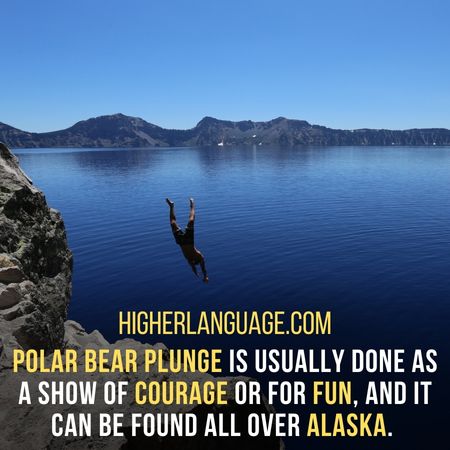
It’s usually done as a show of courage or for fun, and it can be found all over Alaska.
For example, someone might say, “Let’s take the polar bear plunge this weekend!”
8. Muktuk:
This Alaska slang term is used to describe a dish that consists of frozen whale skin and blubber.
It’s a traditional Alaska native food that can be quite an acquired taste!
For example, someone might say, “We had muktuk for dinner last night.”
9. Chilkoot:
This Alaska slang word refers to the Chilkoot Trail, a popular hiking trail in Alaska that leads from Alaska to the Yukon.
It’s a challenging and beautiful trek, so if you hear someone talking about “doing the Chilkoot,” they’re likely referring to this popular trail.
10. Chinook:
This Alaska slang word refers to the Chinook wind. It is a warm, moist wind originating in the Pacific Ocean and making its way inland across Alaska.
When it arrives, it warms Alaska’s air temperature and can even cause snow to melt.
So, for example, someone might say, “A chinook just blew in, and the snow started melting.”
11. Reach:
This Alaska slang term is used to refer to a large area.
For example, someone might say, “We hiked for hours and went through several reaches.” It can also refer to a state of mind or accomplishment.
For example, someone might say, “I finally reached my goal!”
12. Bush:
This Alaska slang refers to a rural area without many roads or people.
Often these areas have no electricity or running water and are accessible only by plane or boat.
For example, someone might say, “We went to Alaska for a weekend and stayed in the bush.”
13. Yukon:
This Alaska slang term is used to refer to an especially cold winter.
For example, someone might say, “It was such a Yukon yesterday!” It can also be used to describe a person or situation that is particularly difficult.
14. Parka:
This Alaska slang word refers to a long coat, usually hooded and often insulated with fur or down feathers.
It is designed to keep the wearer warm in Alaska’s subarctic temperatures.
Parkas are popular among Alaska residents for their warmth and durability and can be found in many different styles, colors, and designs.
15. Gut-It-Out:
This Alaska slang phrase means to tough it out or endure a difficult situation, particularly when the person feels like giving up.
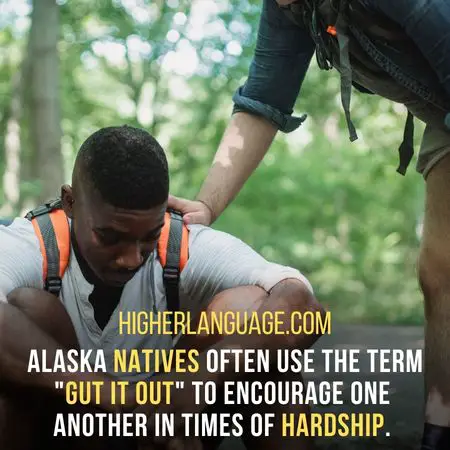
Alaska natives often use it to encourage one another in times of hardship.
For example, if someone quits their job due to cold weather, an Alaska native might say, “Gut it out!”.
16. Hooch:
Hooch is Alaska slang for alcohol, particularly hard liquor.
Hooch is also a type of moonshine produced illegally in Alaska.
Moonshining has existed since the early 20th century and is still practiced in some parts of Alaska.
17. Shoeboxer:
This Alaska slang term refers to someone who is overpaid and underworked.
It comes from the idea that someone works hard enough to fill a shoebox with their paychecks.
So, for example, someone might say, “That guy is a real shoeboxer.”
This term originated in Alaska in the mid-20th century when oil workers were paid high wages for low effort.
18. Hunker Down:
This Alaska slang term means to settle in and prepare for bad weather or a difficult situation.
In Alaska, winters can be long and harsh, so people hunker down with plenty of food, firewood, and entertainment to get them through.
For example, someone might say, “We’d better hunker down before the storm hits.”
19. Canned Alaska:
This Alaska slang term describes canned food that is popular in Alaska and was invented there.
It includes salmon, halibut, crab, shrimp, and other fish. The cans are sealed with a vacuum seal, which keeps the food fresh for long periods.
People in Alaska often use this term to refer to all canned fish products, not just those made in Alaska.
20. Alyeska:
This Alaska slang term is derived from the Athabascan language and means ‘great land’.
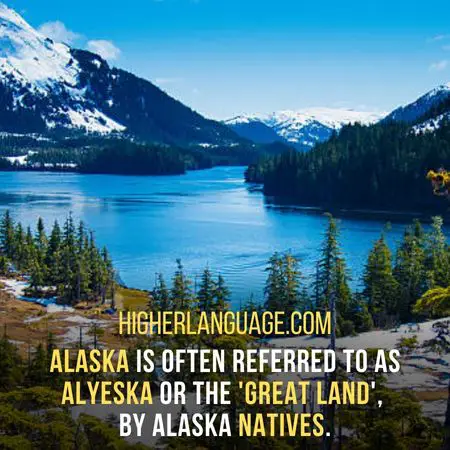
Alaska is often referred to as Alyeska, or the ‘great land‘, by Alaska natives and residents alike.
It is also used to refer to Alaska in general without further explanation.
21. Sourdough:
This Alaska slang term refers to an old Alaska pioneer who has survived in Alaska for many years.
The term also describes someone who has lived in Alaska and adapted to the cold weather and environment.
For example, someone who is a sourdough might be seen as hardy and tough.
22. McGee:
This Alaska slang term refers to someone from Alaska unaffected by the cold weather or discomfort.
A McGee would likely be unbothered by Alaska’s cold temperatures, even during winter. So, for example, a McGee might be seen as brave and tough.
23. Two-Fisted Drinker:
This Alaska slang refers to someone who can drink with both hands or a lot of alcohol.
It also describes someone who doesn’t experience the effects of drinking too much.
For example, a two-fisted drinker might be seen as strong and unafraid.
24. Bush Alaska:
This Alaska slang term refers to the rural parts of Alaska, away from larger cities like Anchorage and Fairbanks.
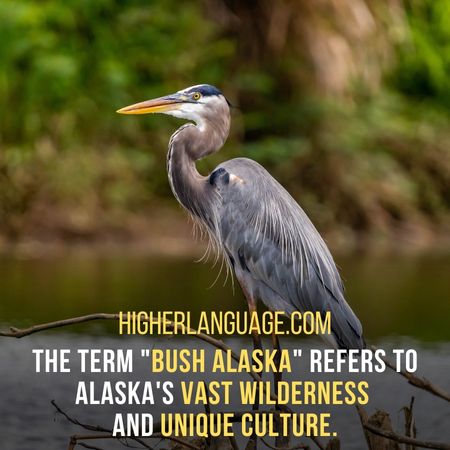
It is used to refer to Alaska’s vast wilderness and unique culture. Someone who came from bush Alaska might be seen as adventurous and independent.
25. Gut-Churner:
This Alaska slang term refers to something so bad that it makes you feel sick, like a scary movie or a tragedy.
It can also refer to someone who tells stories that make you uneasy.
For example, someone who tells ghost stories might be called a gut-churner.
26. Hundie:
This Alaska slang term refers to any number of hundred dollars.
It originated in Alaska’s gold rush days when miners would use $100 bills as currency.
So, for example, if you’re buying something for two hundies, you’re spending $200.
27. Grunge-Sledding:
This Alaska slang phrase refers to sledding on icy, muddy roads.
It is often seen as an exciting and dangerous way to enjoy the winter weather in Alaska.
However, someone who goes grunge-sledding might be seen as daring and fearless.
28. Yukon Jack:
This term refers to Alaska’s favorite drink – whiskey!
Often, Alaska natives will use this phrase when referring to a particularly strong shot of whiskey that packs a punch.
It is also popular to refer to Alaska’s “tough as nails” attitude when facing the cold, dark winter months.
29. Muskeg:
This Alaska slang refers to swamps, bogs, and wet, marshy areas throughout much of Alaska’s terrain.
Muskegs are usually saturated with water and difficult to traverse, so Alaska natives use this word to describe anything challenging.
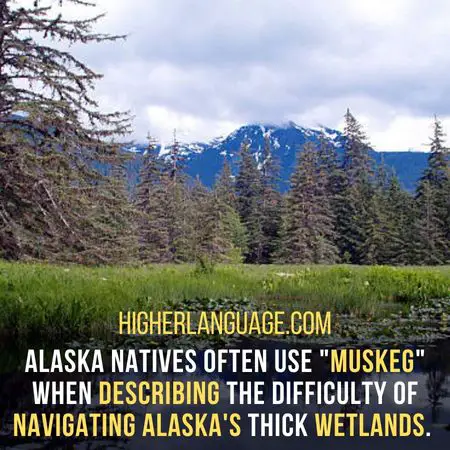
Alaska natives often use this term when describing the difficulty of navigating Alaska’s thick wetlands.
For example, Alaska natives might say, “Be careful when you go out – that muskeg’s treacherous.”
30. Bushwhack:
This Alaska slang phrase refers to someone trying to navigate difficult terrain with limited resources.
Alaska natives often use this term when describing the challenge of traveling on Alaska’s rugged and remote trails.
For example, Alaska natives might say, “It’s a real bushwhack out there!”
31. Yarn:
This Alaska slang phrase is used to describe an entertaining story. Alaska natives often use this term when describing a humorous or exciting tale.
For example, Alaska natives might say, “Come on over, and I’ll tell you one of my yarns!”
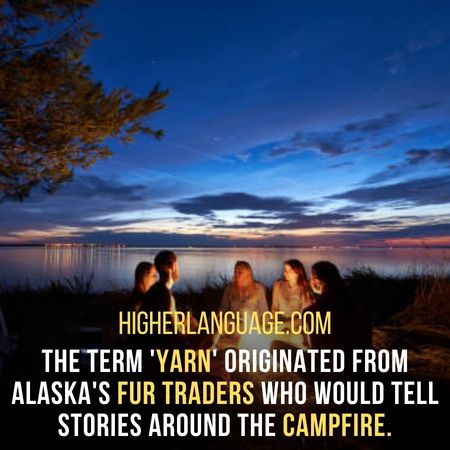
The term originated from Alaska’s early fur traders, who would often tell stories around the campfire after a long day of trapping.
32. The Alaska Way:
This phrase has come to represent Alaska’s sense of community and spirit of camaraderie.
Alaska natives often use this phrase when referring to the unique way that Alaskans take care of each other and look out for one another in times of need.
33. Rock Picking:
This means driving up the Alaska Highway and finding interesting rocks, which you can take home as souvenirs.
Alaska is known for its abundance of geological wonders, and rock picking is a popular Alaska pastime.
34. Cold Shoulder:
In Alaska, giving someone the cold shoulder is common if they do something wrong.
The phrase has been around since the early 20th century and usually refers to ignoring someone as a form of punishment or rejection.
So, for example, if someone has done something wrong, their friends and family may give them the cold shoulder.
35. Frost Heaves:
This Alaska slang phrase describes those pesky bumps in the road that can make driving challenging.
Alaska roads are known for their uneven surfaces, and frost heaves are caused by the freezing and thawing of the ground, which can cause large bumps in the road.
36. Yukon Gold:
This Alaska slang phrase is used to describe something particularly good or enjoyable.
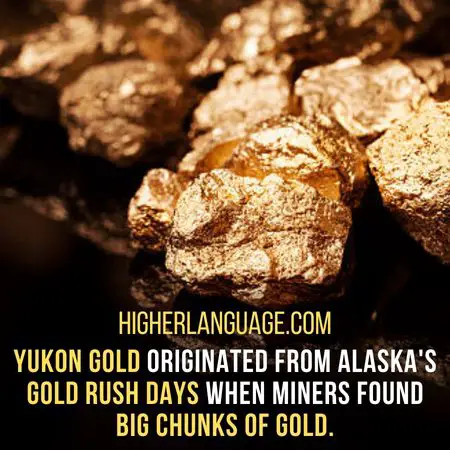
It originated from Alaska’s gold rush days when miners found big chunks of gold (Yukon Gold) in their mines.
The phrase has since come to be used for anything of great quality or value.
37. Ninilchik:
This term is used to describe someone naive or misguided.
It’s based on a small Alaska town of the same name and implies someone doesn’t understand what they are doing or talking about.
For example, “He’s acting like a real Ninilchik right now.”
38. The Alaska Shuffle:
This Alaska slang phrase is used to describe someone who is trying to avoid doing something.
It implies that the person doesn’t want to commit to anything, are “shuffling” around instead.
For example, “She was Alaska shuffling when it came to making a decision.”
39. Kodiak Moment:
This Alaska phrase is used to indicate an unexpected event or surprise.
It’s based on Alaska’s Kodiak Island, known for its dramatic natural events like earthquakes and volcanic eruptions.
For example, “We were hit with a real Kodiak moment when the power went out.”
40. Chitina Dip:
This Alaska slang phrase describes a person who talks a lot and doesn’t contribute much action.
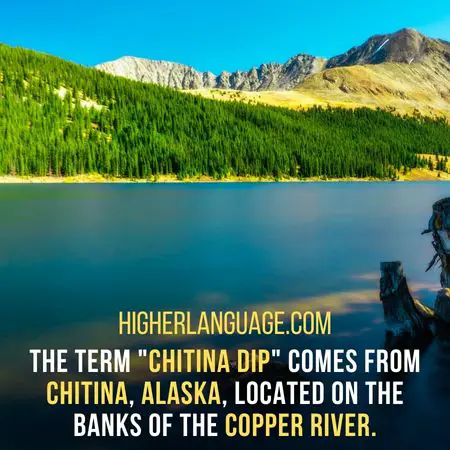
It comes from Chitina, Alaska, located on the banks of the Copper River, where people are known for being talkers but not doers.
For example, “He’s a real Chitina dip, always talking and never doing anything.”
41. Going Alaska:
This Alaska slang phrase describes someone who goes off the grid.
It encompasses camping, hunting, fishing in Alaska’s remote areas, and doing things independently from society or technology.
For example, “We’re going Alaska this weekend, so don’t expect us to have cell phone service.”
42. The Alaska Boot:
This Alaska slang phrase is used to describe Alaska’s cold weather.
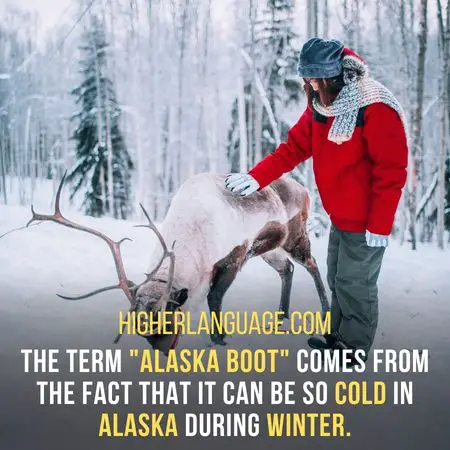
It comes from the fact that it can be so cold during Alaska winters that your boots freeze to the ground once you take them off.
For example, “It’s Alaska boots out there today. Don’t forget your mittens!”
43. Cold Country:
Alaska is known as the “cold country” due to its brutal winter temperatures and snowy landscape.
This phrase is commonly used when referring to Alaska’s cold climate. For example, “I’m so glad I don’t live in the cold country anymore!”
44. Bogos:
This Alaska slang word is used to describe someone who is acting foolish or doing something stupid.
For example, “Stop being bogus and put on your jacket!” This term originated in Alaska’s Inupiat language.
45. Moose Juice:
This Alaska slang phrase describes beer – typically light beers such as Budweiser or Coors Light.
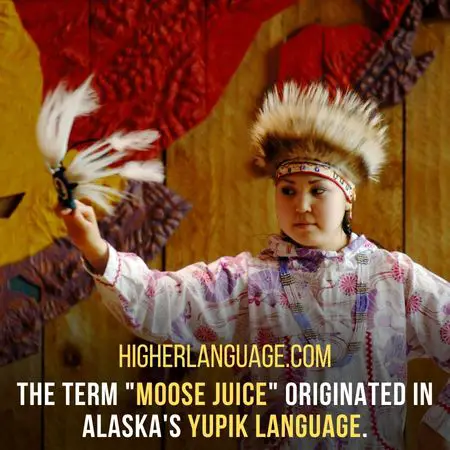
For example, “Let’s grab some moose juice and watch the hockey game.” This term originated in Alaska’s Yupik language.
Final Thoughts:
Alaska is beloved by many for its unique culture and language.
Alaska has unique slang words and phrases, which are important to learn if you plan to visit or move there.
Alaska slang words and phrases are a fun way to learn about Alaska culture.
Whether you visit or live there, learning these expressions is important to understand the locals better. So grab your coat and hat because Alaska is waiting for you!
- What Language Do They Speak In The Philippines? Explore! - March 20, 2024
- What Language Do They Speak In Nepal? - March 20, 2024
- What Language Do They Speak In Poland? Explore More - March 19, 2024
